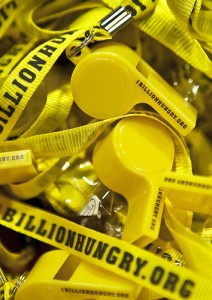
This whistle is being used by people to call attention for the hunger problem in the 1 Billion Hungry campaign.
The 1billionhungry campaign was officially launched in Brazil on Thursday, July 1st. The purpose of this initiative is to put pressure on politicians to combat hunger. Sponsored by the Food and Agriculture Organization, FAO, the global campaign is virtually catching the attention of audiences everywhere with the help of social media and web tools. There is a symbol to this campaign, a yellow whistle, which helps audiences to make themselves noticed.
Podcast: Play in new window | Download
Subscribe: Apple Podcasts | Google Podcasts | RSS
Blow the yellow whistle and bring the noise!That's what Brazilian bloggers started doing: they reproduced the release provided by FAO, as did alinemenezes, but, digging a little deeper, some elaborate thoughts emerged. Not all comments are related to the 1billionhungry campaign but they are helpful to see the big picture and try and capture what are the thoughts of bloggers regarding the hunger debate.
Messias Martins talked about statistics and posed a question [pt]:
Para você ter uma idéia o Brasil é o 4º maior país em produção de alimentos no mundo. O Brasil é o 6º país no mundo em subnutrição. Para onde vai tanta comida?
Wilke Lima cited [pt] Josette Sheeran, from the United Nations Food Programme:
Um mundo faminto é um mundo perigoso…. sem comida as pessoas tem apenas três opções: fazer protestos violentos, emigrar ou morrer. Nenhuma dessas opções é aceitável
He argued that nations probably know what needs to be done to combat hunger but [pt]:
É mais cômodo e mais seguro responsabilizar o crescimento populacional, a preguiça do pobre ou ainda as adversidades do meio natural como causas da miséria e da fome.
Zelmar Guiotto and Socialismo e Democracia have posted on their blogs a report by Carta Maior magazine which presented an interview with french agricultural engineer Marcel Mazoyer, who stated [pt]:
A falta de alimentos para grande parte da população é fruto de um processo histórico de desenvolvimento agrícola desigual e não pode ser resolvida com o simples aumento da produção(…) a parcela da população global que tem menos acesso aos alimentos é justamente a dos camponeses.
Mr. Mazoyer has a point of view on the effects of market practices on the agricultural activity, as reported by the both bloggers [pt]:
Atualmente, o mercado equilibra a oferta e demanda daqueles que podem pagar e não a oferta e a necessidade.
Marcão Tilápia – O Pescador, a fisherman blog, discusses some data on poverty and presents his opinion on the hunger matters in Brazil [pt]:
(…) existe um conluio disfarçado de grande parte de nossa sociedade hipócrita, especialmente a de classe mais “abastada”,usando um simples exemplo: PREOCUPAÇÃO EM TRATAR BEM, ANIMAIS DE ESTIMAÇÃO, (não que eles não mereçam ) gastando seus recursos financeiros de forma exagerada,em detrimento aos seus semelhantes carentes de tudo, que poderiam simplesmente ajudar. Na defesa de seus interesses e de ponto de vista, preferem dizer que isto é tarefa do Estado ou dos políticos, afinal, para tal foram eleitos, considerando a carga tributária que lhes são impostas, cuja arrecadação, não recebe prioridade de aplicação em áreas sociais em geral.
Earthlingorgeous makes a clear statement: the problem goes beyond not having enough to eat:
Most people think of malnutrition as not having enough to eat. But for many of the world’s one billion hungry people, the problem is that they get too few of the minerals and vitamins that they need to thrive, physically and mentally.
Kale puts it in another words:
The 1.02 billion people only tells us how many are undernourished, it says nothing about the millions of people who are “malnourished”, those who do eat, but not have a full diet.
According to Jacques Diouf, FAO Director-General, a hungry man is an angry man. The 1billionhungry campaign promotes intense video messages by actor Jeremy Irons, who claims to be “mad as hell” because 1 billion people live in chronic hunger. Watch his video to understand why FAO's director is equally angry.
Society isn't always aware of how to act. Stop racism, stop war, stop hunger… So many agendas, so many ways to work for the benefit of the community: by blogging, volunteering, donating, and so on. Another way to contribute is by taking part of online petitions, which have gained momentum with the adoption of e-mails and other web tools. Complementing traditional door-to-door requests, or even innovative performances in public spaces, petitions now can reach a global scale. One of the key aspects about 1billionhungry is how easy it is to participate – as simple as filling in a form in the web. Besides, the communication strategy counts on a website which is written in multiple languages, in other words, that has global reach. Depending on the results of this campaign, online communities might have new references for civic engagement.








1 comment
Our planet’s many threats are converging, and many of them will be from the impacts of unsustainable human numbers. Lack of arable land, food, water, climate change, peak oil will mean that we will be in danger of racism, terror, wars and shortages. We ignore the perils of over population at our own risk. Putting pressure on politicians to solve the problem of hunger is optimistic unless there is an effort to encourage family planning and discourage multiple babies. Instead of yellow whistles, what about yellow condoms?